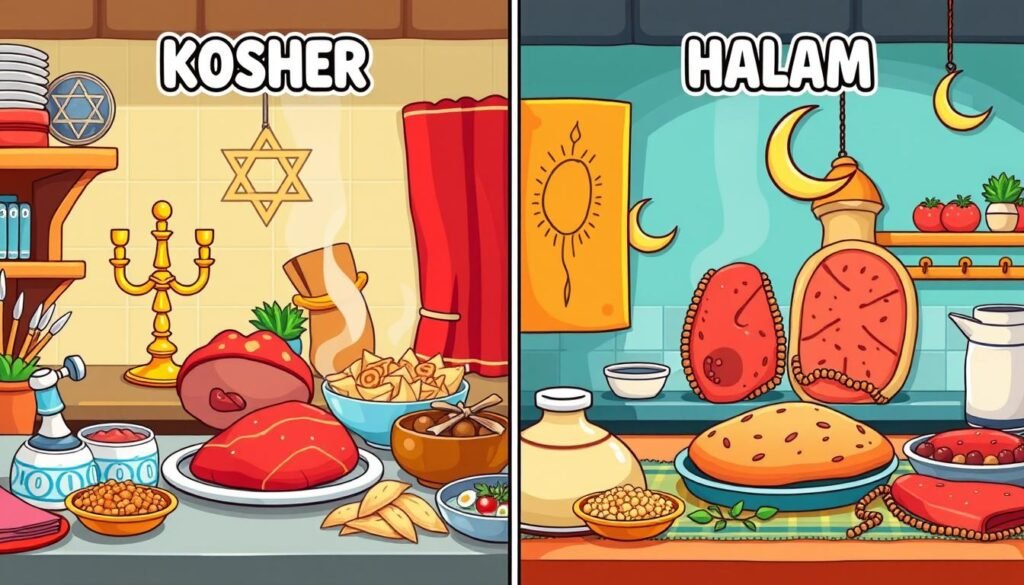Have you ever thought about if a Muslim can eat kosher food? This question is important in multicultural places. It talks about food rules between kosher and halal.
Kosher and halal are about what is okay to eat, based on Jewish and Islamic laws. With 1.6 billion Muslims worldwide, and only 17% of U.S. Jews keeping kosher, this topic is key.
We will look at kosher and halal rules. We will see what they have in common and what’s different. This is important because halal food is getting more common in U.S. restaurants.
But, only about 10% of products are halal certified. This shows the problem Muslims face in following their food rules. For more on this, check out Kosher and Halal food compatibility.
Understanding Kosher and Halal Dietary Laws
Kosher dietary laws come from Jewish scriptures like the Torah and Talmud. They set rules for what foods are okay to eat and how to prepare them. Keeping kosher shows a person’s commitment to spiritual purity and community values.
Halal dietary laws guide what Muslims can eat, based on the Quran. These rules help ensure food choices match a person’s faith. The halal symbol on food means it’s okay for those following Islamic teachings.
Both kosher and halal laws are spiritual guides. They show a deep faith connection through food choices. Knowing about these laws helps us appreciate different cultures and religions. Food plays a big role in religious life, showing our commitment to ethics and community.
Similarities Between Kosher and Halal
Looking into kosher similarities and halal similarities shows a deep connection. Both focus on cleanliness and treating animals right. They also ban eating pork and blood, showing shared values.
Both religions have strict rules about what to eat. These rules are key to their culture. They also bring people together through meals and rituals. Food is seen as a way to show respect and health.
More people are looking for food that fits these rules. This shows we value our food choices more. It helps us understand and respect each other better.
Differences Between Kosher and Halal
I often think about the differences in kosher and halal laws. These laws come from religious beliefs about what we can eat. They show how different cultures view food.
Method of Slaughter
The way animals are killed is a big difference. Halal slaughter, or Zabihah, requires saying Allah’s name before killing. This shows a spiritual connection to the act.
Kosher slaughter, or shechita, aims for a quick and painless death. It focuses on treating animals well. Halal adds a spiritual layer not found in kosher.
Permissible Animals
What animals are okay to eat is another big difference. Kosher rules are strict, allowing only certain animals. These must chew their cud and have split hooves.
Halal rules are more open, allowing many animals. Both say no to pork. But kosher has more rules, making it harder to know what’s okay.

Can A Muslim Eat Kosher Food?
Dietary choices among different faiths often spark interesting questions. The topic of Muslims eating kosher food is one such question. It’s important to note that not all kosher foods are halal.
Muslims eating kosher food must check if it follows halal rules. This includes how the food is slaughtered and if it’s mixed with non-halal items. Experts like Amina Inloes have talked about these rules a lot.
The food market is changing, with more people looking for different food options. The halal food market is huge, over two trillion U.S. dollars. Knowing about kosher can help Muslims and others make better food choices.
Kosher Certification and Its Importance
Kosher certification is more than just following dietary rules. It builds trust in Jewish communities and ensures products are genuine. As people pay more attention to what they eat, the need for trustworthy kosher labels has grown.
This rise began in the 1950s. Back then, Orthodox Jews heavily relied on labels to check if food was kosher.
Kosher Certification Process
The kosher certification process checks every ingredient and how it’s made. Authorities look at all parts of food production to make sure it follows Jewish dietary laws, or Kashrut. This careful check ensures products are kosher and have a recognized label.
The Orthodox Union’s OU symbol is on over 400,000 products in 80 countries. This shows how strong and widespread kosher certification is.
Recognized Kosher Certifying Authorities
Many kashrut organizations work to ensure kosher certification in the U.S. and worldwide. Over 100 agencies are recognized on kosherquest.org. This big network helps keep food standards high.
It makes consumers confident in their choices. It also helps keep cultural and religious dietary practices alive. Having trusted bodies means products are available for different communities, including those who follow halal.
Halal Certification and Its Implications
Halal certification is key to making sure products follow halal standards. It’s important for Muslims because it shows food is made right according to Islam. It focuses on food safety, like animal care and no forbidden stuff.
In the US, more agencies are checking for halal products. This shows more businesses want to be halal and kosher. Groups like the Islamic Food and Nutrition Council of America (IFANCA) help make people trust halal food.
Halal isn’t just for food. It’s about living right, too. So, everything we eat must be halal. This makes people think more about what they buy, changing how we shop.
The Role of Religious Authorities
It’s important to understand the role of religious leaders in guiding dietary laws. They set rules that followers must follow. This helps create a sense of community and identity through food choices.
Their teachings are seen in kosher rules for Jews and halal guidelines for Muslims. These rules are set by religious scholars.
Rabbinical Guidelines for Kosher
In Judaism, rabbinical rules are key to kosher dietary laws. Only certain animals, like those that chew the cud and have split hooves, are okay to eat. Animals like camels, pigs, and shellfish are not allowed.
Meat and dairy must be kept separate. This shows how careful these teachings are.
Islamic Guidelines for Halal
In Islam, guidelines help decide what’s okay to eat. Halal foods and practices follow Islamic teachings. Animals must be slaughtered with care and a prayer to Allah.
Pigs and some other animals are not allowed in the halal diet. These rules show respect for life and ethical eating. They are a big part of being a Muslim.
Comparative Analysis of Slaughter Methods
Looking into different slaughter methods shows us a lot about culture and religion. Kosher shechita and halal dhabihah are interesting. They show how important it is to treat animals kindly and think about what we eat.
Kosher Shechita vs. Halal Dhabihah
Kosher shechita is done by a trained person with a quick throat cut. This makes the animal suffer less, following Jewish rules. Halal dhabihah might include stunning, but it’s not always needed.
Anyone who is Muslim can do dhabihah, showing different views in these methods. Both methods need the animal to be alive and healthy. They also both make sure to drain the blood, important in both Jewish and Islamic traditions.
But, kosher shechita needs a smooth cut, while dhabihah allows for small mistakes. These small differences show how culture and religion affect how we see animal welfare.
There’s debate on stunning animals. Jewish law says no, but Islamic views vary. Some Islamic scholars think stunning is okay in certain cases. This shows a deep discussion on animal rights and ethics in both religions.
As more people learn about these laws, it’s not just about food. It’s about morality and how we treat living beings. Knowing about these methods helps us understand the values behind different faiths’ dietary rules.
Common Dietary Restrictions in Both Faiths
Religious beliefs and diet often meet in interesting ways. Dietary restrictions in Judaism and Islam are key. They guide what foods are okay and what are not.
Both faiths say no to pork and blood. This shows their commitment to eating right and staying pure. Following kosher and halal rules is more than just food choices. It’s about faith and obeying God.

Each faith has strict rules for animal food preparation. These rules make sure animals are treated right before being eaten. It shows that food is more than just to eat.
Forbidden foods remind followers of important values. They teach about ethics in both Judaism and Islam. By following these dietary restrictions, people think deeply about their choices. It shapes who they are and how they connect with others.
Cultural Significance of Dietary Laws
Dietary laws are more than just food rules. They are deeply rooted in Jewish and Muslim cultures. Following these laws strengthens community bonds and creates shared memories through food.
When people eat according to their faith, it becomes a special act. It turns a simple meal into a meaningful religious experience.
Impact on Community Identity
Communal meals show a shared commitment to faith. Keeping kosher or halal helps preserve cultural heritage. It also strengthens family bonds across generations.
When families eat together, the food connects them. It ties them to their faith and tradition. In a world of change, these traditions help people feel part of a community.
Religious Devotion Through Food Practices
Food is a key way to show religious devotion. Following dietary laws reminds people of their spiritual duties. It’s not just about eating; it’s a celebration of faith.
Prayers before meals, special slaughtering, and choosing ingredients carefully all show devotion. These practices are a big part of community culture.
Navigating Kosher and Halal Options in the U.S.
In the American food market, finding the right food is key. This is true for those looking for kosher and halal food. Many stores and restaurants across the U.S. offer these options. They know how important it is for Jewish and Muslim communities.
Knowing about certification labels helps us make better choices. Learning about kosher and halal production makes us appreciate these traditions more. The halal food market is growing fast, showing more people want food that is both good and right.
As more places offer halal and kosher food, we get to see the American food market in a new light. It’s a chance to challenge old ideas and bring people together. Knowing about these food choices helps us respect the traditions that shape our meals. It makes our society more rich and diverse.
FAQ
Can Muslims eat kosher food?
What are the key differences between kosher and halal dietary laws?
Are there similarities between kosher and halal practices?
What is kosher certification and why is it important?
What does halal certification entail?
How do religious authorities impact kosher and halal dietary practices?
What are the methods of slaughter in kosher and halal practices?
What common dietary restrictions exist in both faiths?
How do dietary laws contribute to cultural identity?
How can consumers navigate kosher and halal options in the American food market?

Embracing Faith, One Insight at a Time!
The teachings of the Quran have always guided my path. With a deep passion for Islamic knowledge, I strive to blend the wisdom of tradition with the relevance of today, making the timeless messages of Islam accessible and meaningful for everyone.
Muslim Culture Hub is my platform to share historical insights and thought-provoking articles, exploring both well-known and lesser-discussed aspects of Islamic culture and beliefs. My mission is to create an inclusive online space where everyone can learn, strengthen their faith, and connect with the profound message of Islam.
Join the journey!
May peace be upon you.









